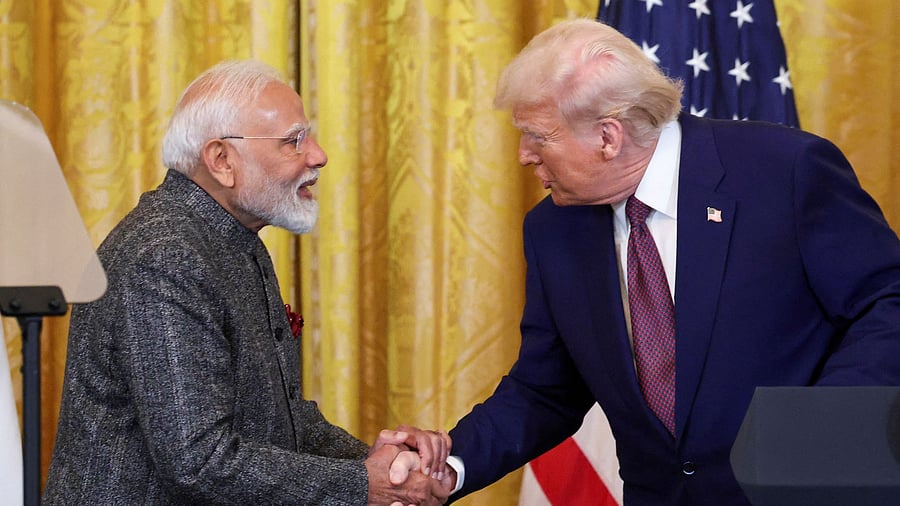
US President Donald Trump and Indian Prime Minister Narendra Modi shake hands.
Credit: Reuters File Photo
India and the United States have finalised the terms of reference for the first phase of a bilateral trade agreement to be concluded late this year, with a view to reaching bilateral trade worth $500 billion by 2030.
Virtual and in-person trade talks are set to continue over coming weeks and months, with India's restrictions on farm goods one of the thorny areas. Here are some of the issues at the heart of negotiations between New Delhi and Washington.
Concerns over staples
India is resisting US pressure to lower tariffs on staples like rice and wheat, while signalling its willingness to cut tariffs on other farm goods such as almonds, cranberries, quinoa, oatmeal, pistachio, and walnuts.
Still, corn and soybeans are expected to feature in the negotiations, with the United States eager to sell these two agricultural products to India.
India needs corn to boost ethanol production, but its regulations prohibit ethanol made from imported grains. Additionally, while India does not allow genetically modified (GM) food crops, and the US primarily grows GM corn.
The US is trying to push India to import corn, arguing that ethanol made from it would be used only for blending with gasoline, without seeping into Indian agriculture.
India imports small quantities of non-GM soybeans, and the United States wants New Delhi to permit imports of American soybeans.
The United States is also keen to export animal feed to India.
Tariff barriers
Washington has raised concerns about India's average applied tariff rate of 39 per cent on farm goods, with duties as high as 45 per cent on vegetables oils and around 50 per cent on apples and corn.
The United States believes India's high tariff rates are a major trade barrier for US agricultural and processed food exports such as poultry, potatoes, citrus, almonds, pecans, apples, grapes, canned peaches, chocolate, cookies and frozen French fries.
In 2024, US exports of farm and allied goods to India totalled nearly $2 billion, while India's farm exports to the United States were worth around $5.5 billion.
India's food and beverage market, growing at an average annual rate of around 10 per cent, is expected to reach nearly $550 billion by 2028, attracting increased interest from US companies.
Non-tariff barriers
Washington has urged India to remove non-tariff barriers such as quantitative restrictions on imports of protein-rich pulse varieties, import licence requirements and overall regulations on imports. It also expressed concerns about India's sanitary and phytosanitary rules for food imports.
In addition to tariffs of up to 60 per cent on some dairy products, India requires imported dairy to come from animals not fed internal organs, blood meal or similar byproducts - a rule US officials say effectively restricts access to one of the world's largest dairy markets.